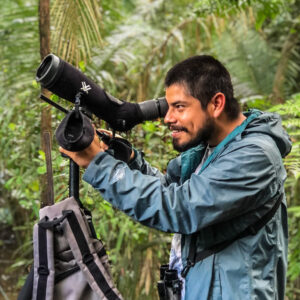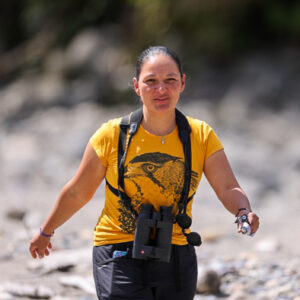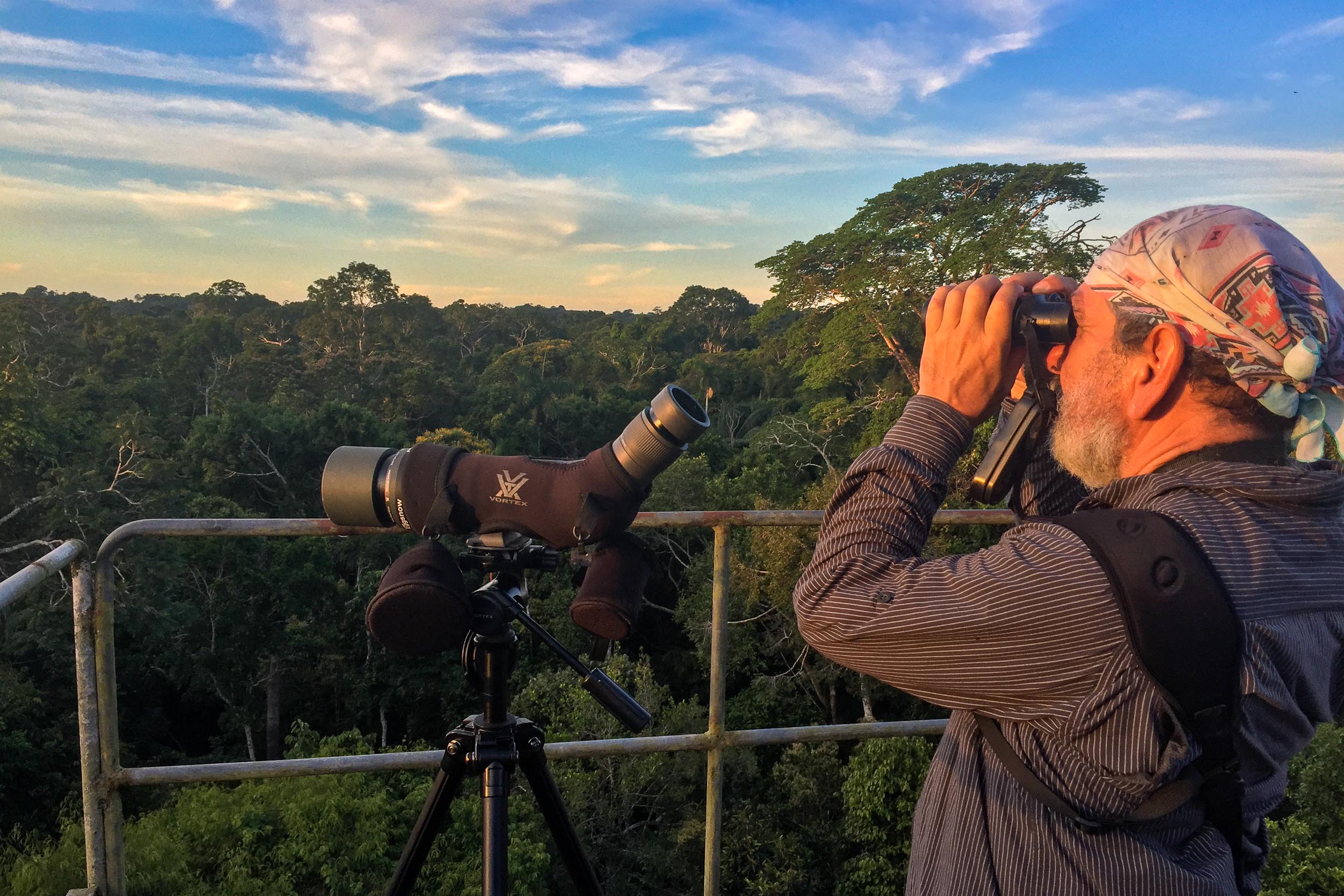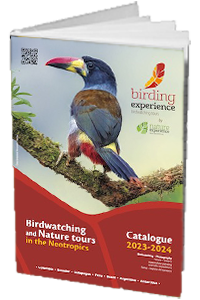Your travel expert
Xavier Amigo
Responsible for naturalist, botanical and ornithological travel. Responsible of fixing and professional contact.

The Tumbes bio-region, which straddles southern Ecuador and northern Peru, is one of South America’s most important biodiversity hotspots.
Southern Ecuador is among the most exciting regions for ornithological and wildlife discoveries. Off the beaten track, each corner offers varied and exotic wildlife with numerous endemic species. Of the country's large continental bioregions, the Tumbes region, which straddles the Peruvian border, is the richest in range-restricted species. From the mangrove swamps bathed by the cold currents from distant Chile, through the great undulating plains where deciduous kapok forests abound, the terrain rises towards the páramos, passing through magnificent high-Andean groves and great herbaceous steppes before losing itself, in the east, in the tepuys of the Cordillera del Condor and the Cutucú. We will also explore the lush rainforests of the eastern Andean foothills and the Amazon basin.
This variety of distinct ecosystems makes for a highly specialized birding tour, which will include many national and regional endemics, including the endangered El Oro Parakeet, … warbler, and, of course, Ecuador’s newest endemic hummingbird species, the …. hummingbird.
Your travel expert
Xavier Amigo
Responsible for naturalist, botanical and ornithological travel. Responsible of fixing and professional contact.

Arrival in Guayaquil. Transfer from the airport to our hotel. Briefing on the upcoming trip. Dinner and overnight stay in a comfortable hotel.
We will take the road south to the Manglar de Churute reserve from Guayaquil. This reserve mainly consists of dry woods and scrubland, with many mangroves where local fishermen hunt crabs. After walking the reserve trails, we will also have the opportunity to take a boat ride through the labyrinthine mangrove forests in search of aquatic species that thrive in this peaceful ecosystem. We will then continue our descent towards the south through rice fields and banana and cocoa plantations. Arrival in the late afternoon at the private reserve of Buenaventura, where we will spend the night.
Dinner and overnight in a charming lodge.
Target birds: Horned Screamer, Pacific Royal Flycatcher, Little Blue Egret, White Ibis, Jet Antbird, Rufous-necked Woodrail, Common Black Hawk
This reserve belongs to the Jocotoco Foundation. It hosts many threatened species between the subtropical and foothill forest altitudinal levels. The area is located in the contact zone between the southern end of the Chocó bio-region and the northern end of the Tumbesian bio-region. Therefore, it contains species from both regions, and the considerable bird checklist of the reserve reflects this. We will first explore the upper part of the reserve, which is more humid, in search of Chocó species and two highly localized megas (endemic to the Province of El Oro). Afterward, we will walk through the drier, lower part of the reserve for the Tumbesian species.
Dinner and overnight in a charming lodge.
This morning, we will spend time exploring new trails in the reserve before spending some time photographing hummingbirds around the feeders. Buenaventura Reserve is also home to a large number of endangered and endemic orchid species, such as Dracula cordobae and the spectacular Cattleya maxima, and mammals like coatis and agoutis can also be found. We will hopefully be able to observe many of these other natural wonders during our stay. We should also be able to head out on the trails at night in search of owls and nightjars.
Dinner and overnight in a charming lodge.
Target birds: Long-wattled Umbrellabird, Rufous-headed Chachalaca, Black-and-white Owl, Slaty-winged Foliage Gleaner, Uniform Antshrike, Brownish Twistwing, Song Wren, Thrush like Schiffornis, Club-winged Manakin, El Oro Tapaculo, El Oro Parakeet, Spotted Nightingale Thrush, Emerald-bellied Woodnymph, White-vented Plumeleteer
We will leave Buenaventura early in the morning and head southeast to the Peruvian border near Macara. The few stops along the way will allow us to look for some species typical of the semi-desert ecosystems of the Tumbesian region. Arrival in the late afternoon in the Jorupe reserve.
Dinner and overnight in a charming lodge.
The Jorupe Reserve also belongs to the Jocotoco Foundation. It protects several hectares of typical Tumbesian forest made up of tall, intractable scrub and low deciduous forest dominated by Kapok trees (or Ceibos) with gigantic trunks. These dry forests have largely been destroyed to make way for agriculture. This ecosystem is home to many endemics and specialized species. We will search for all these specialties throughout the day from the access track and the paths winding through this dense forest.
Dinner and overnight at a charming lodge.
Target birds: White-tailed Jay, Slaty Becard, commun), Plumbeous-backed Thrush, Ecuadorian Piculet, Blackish-headed Spinetail, Rufous-necked Foliage Gleaner, Watkins Antpitta, Pale-browed Tinamou, Henna-hooded Foliage Gleaner, Ochre-bellied Dove, Gray-breasted Flycatcher, Long-billed Starthroat
Today, we will drive to Utuana Reserve, a new reserve owned by the Jocotoco Foundation. Our first stop will be in the village of Sozoranga, where we will look for a colony of Red-banded Swallows. We will then spend most of the day exploring the reserve’s trails. The reserve is home to dwarf highland forest mixed with scrub and dense patches of Chusquea bamboo. Many of the species found here are endemic to Ecuador.
We return to our lodge to spend the last night.
Target birds: Jelski Chat Tyrant, Loja Tyrannulet, Chapman Antshrike, Three-banded Warbler, Black-crested Tit-Tyrant, Rainbow Startfrontlet, Purple-throated Sunangel, Gray-headed Antbird, Black-cowled Saltator, Piura Hemispingus, Chestnut-collared Swallow
Today, we will begin climbing the Andes. We will slowly climb the foothills of the western range, passing through the semi-desert valleys of Catamayo, where new vegetation of savannahs and scrub awaits us. In the middle of the day, we will pass through the peaceful village of Vilcabamba and then continue our journey to the Tapichalaca lodge.
Dinner and night in a charming lodge.
This legendary reserve is home to the only known population of Jocotoco Antpitta. The story of the discovery of this antpitta represents one of the historic achievements of neo-tropical ornithology in the last twenty years. The reserve is also home to a large area of temperate forest on the edge of the Podocarpus National Park, threatened by the rapid increase in agriculture and livestock farming. Several rare and hard-to-see species are common here. During our three-day stay, we will explore the different trails in the reserve, allowing us to access different high-altitude ecosystems. We will also take half a day to descend into the upper valley of the Rio Marañon, home to several endemic species with a limited distribution.
Dinner and night in a charming lodge.
We will take some time on this last morning to descend into the upper valley of the Rio Marañon and explore this unique area, home to several endemic species with a restricted distribution. We will then continue eastwards into the Jivaro territories of the upper Nangaritza Valley to the Yankuam Lodge. This small reserve and rustic lodge are located at the foot of the mysterious Cordillera del Condor, at the gateway to Shuar Indigenous territory. Many surprises await us here, but the star bird is undoubtedly the wonderful Orange-throated Tanager.
Dinner and night in a rustic lodge.
This reserve is home to many ornithological surprises. We will walk along the road from our lodge to the small Shuar village of Shaime in search of local birdlife. Birding the road and the short trails in this lower section should yield good numbers of tanagers, jacamars, flycatchers, and woodcreepers, and we will hopefully come across several big mixed flocks. We will also go out at night in search of some local rarities.
Dinner and overnight in a rustic lodge.
Today, we will leave early to explore the impressive tropical vegetation of the Nuevo Paraiso Reserve. This reserve is located opposite the Cordillera del Condor and is protected by the Shuar people from the advancing mining industry. These isolated patches of forest are home to a wide variety of rare species.
Dinner and overnight in a rustic lodge.
Early departure from our lodge to go along the Cordillera del Condor one last time, for our last observations of this low altitude birdlife. Returning to Zamora will allow us to split our ascent to the north, explore the Copalinga Reserve, and take a well-earned rest. Upon arrival at Copalinga Lodge, we will spend the rest of the day at the hummingbird and fruit feeders in front of the lodge, where we can take photos and add new species to our list.
Dinner and overnight in a charming lodge.
Copalinga is located in the foothills of the eastern cordillera near Zamora and on the eastern edge of the Podocarpus National Park. Many species are restricted to this altitudinal range. We will first walk the trails of the Copalinga Lodge for low-altitude species. Then, we will go to the Bombuscaro entrance of the Podocarpus National Park for species limited to higher altitudes, spending some time birding the park trails.
Dinner and overnight at the same lodge.
A long day of driving awaits us today. We will leave the warm tropical atmosphere of the far east and head north. On the way, we will take time to explore the tropical vegetation of the old road from Loja to Zamora, famous for its large mixed flocks of tanagers. Depending on how much time we have left, we can stop in the town of Loja to try and see the rare Kopecks Screech Owl. Along the cordillera, we will bird the high-Andean vegetation to observe high-altitude birds like Rainbow Thornbill, Red-bellied Tanager, Green Thornbill, Mountain Caracara, Pale-naped Tohi, Blue-capped Conirostre. Arrival at the indigenous villa of Saraguro in the late afternoon.
Free dinner and nights in a hostel.
Traveling along the E35 highway allows us to visit some remote Andean areas. Near our base in Saraguro, the forests of Cerro Acanama will enable us to explore a little-known ecosystem rich in birdlife. We will take our time searching for Crescent-faced Antpitta and …. In the dense bamboo, before heading higher up to look for ….. Finally, we will attempt to locate the rare …. Cotinga, a tricky species with a highly localized range. Then, we will visit the Huashapamba Community Conservation Area, which protects one of the last remaining high-Andean forests in the region, a refuge for the Salvin's Caicos, which feeds on Miconia and Viburnum berries.
Free dinner and nights in a hostel.
The grasslands and shrubbery of the Cerro de Arcos highlands, a remote, hostile, windswept rock formation, was the scene in 2017 of one of the most surprising ornithological discoveries of recent decades. No one expected to find a population of a strange and unknown hummingbird here. At an altitude of 3700 meters, between the provinces of El Oro and Loja, the Chilla mountain range is home to only a few islands of native vegetation, mainly composed of terrestrial bromeliads and especially chuquiragua, whose orange flowers, typical of Ecuadorian páramos, are the primary source of food for the Blue-throated Hillstar. Once we’ve seen this spectacular hummingbird, we will return to the Santa Isabel Valley along the Giron road until we reach Yunguilla Reserve.
Dinner and overnight in a standard hotel.
Early lunch and transfer to the Yunguilla reserve to observe the only population of the endemic Grey Bushfinch and some other range-restricted species of this small area of foothill forest: Striped Bushfinch, Red-headed Grasshopper, Tawny-crested Tyrannulet, Ecuadorian Blackbird, Yellow-headed Cardinal. We will arrive in Cuenca in the evening. Dinner at leisure and overnight in a colonial hotel where we will enjoy a peaceful return to civilization. If you arrive early enough in Cuenca, take the time, even at night, to visit the city center, which is considered one of the most beautiful and pleasant in the country.
Dinner at leisure and overnight in a colonial hotel.
Today, we will visit the Cajas National Park, or the “Park of a Thousand Lakes.” In the heart of sumptuous and grandiose landscapes, we will explore different high-altitude ecosystems: temperate forest, Polylepis forest, páramos, and high-altitude lagoons. In these high-altitude areas, we will look for specialized species.
After lunch, at an altitude of more than 4000 meters, we will drive through the tropical heat of the banana, oil palm, and cocoa plantations to the largest city in Ecuador. We will arrive in Guayaquil in the afternoon for our international flight, where our magical sojourn through southern Ecuador comes to an end.
Target birds: Gray-breasted Mountain Toucan, Andean Teal, Yellow-billed Pintail, Andean Ruddy Duck, Tawny Antpitta, Giant Conebill, Tit-like Dacnis, Red-rumped Bush Tanager, Violet-throated Metaltail
Dates of the next departures
Departures possible all year round (best period between October and March), contact us.
You want a personalized departure date? Contact us. Request a personalized date
Prices per person
| Year | 2 travelers | 4 travelers | 6 travelers | 8 travelers |
|---|---|---|---|---|
| 2025 | 7,410 US$ | 5,090 US$ | 4,190 US$ | 4,040 US$ |
You are a group of travelers and want a special rate? Contact us. Request a personalized quote
Included
Not included
Payment and reservation terms
To book your tour, please confirm your agreement in writing to the local agent.
The agency declines all responsibility for the performance of the confirmed services in case of non-compliance with the above payment terms.
Important note
Itineraries may be subject to last-minute changes due to natural events or changes in domestic legislation. The visitor must take into account and accept the possibility of last-minute changes in the organisation of the trip. The operator therefore reserves the right to make the necessary changes to ensure the safety and integrity of the travellers and to respect the laws in force. The hotels are given as an indication only and are subject to availability at the time of booking the tour. In case of unavailability, a hotel of the same category will be proposed.
Formalities
Formalities: Passport valid 6 months after your return date. No visa is required at this time. Your health insurance (private or public) is mandatory to enter Ecuador.
Vaccinations: Although no vaccinations are compulsory, we advise you to consider vaccinations against tetanus, yellow fever and hepatitis A and B as essential.
We recommend that you consult your doctor before departure and that you take out insurance to cover medical expenses and repatriation.
Concerning parasitic diseases transmitted by mosquito bites (such as malaria, dengue fever, Chikungunya), please note that Quito and the centre of the country and the Galapagos are not affected. Furthermore, the majority of the country's risk areas are not in the areas we visit on our tours.
Your guides for this trip

Juan Carlos Figueroa


Juan Carlos is an ecuadorian/mexican biologist and nature/birding tour guide, grown in the city of Guayaquil, Ecuador. He is a passionate naturalist with a lifelong interest in wildlife, which evolved at the age of 20 into an absolute fascination with birds and conservation. In its beginnings in birdwatching his favorite place for birding was a forest in his hometown called Cerro Blanco Protected Forest. In which after a few years he decided to train to work as an environmental interpreter. This was a decisive step in his life, as this led him to discover his vocation to share his passion for the birds and their conservation. During the last seven busy years he has devoted himself entirely to working as a guide, traveling, and birding to new areas and has collaborated in bird conservation projects in Ecuador. He has traveled extensively to all 24 provinces of Ecuador, leading tours to different parts of the country specially the west, north and south of it. With his age of 29 he is one of the most experienced birders of Guayaquil and Ecuador, having seen over 1,100 species. Juan Carlos seeks to achieve its dream of encouraging bird conservation in Ecuador and guiding groups of birdwatchers worldwide.

Natalia Escobar


Natalia was born and raised in the lush cloud forests of Mindo, in the heart of Ecuador's Chocó region. Her connection with nature took root from an early age in the so-called "feather valley". Over the years, this connection has evolved into a deep love and passion for the natural environment. As a naturalist guide specializing in birdwatching for over a decade, she has had the privilege of sharing this passion with visitors, explorers and nature lovers alike. Through trips and expeditions throughout Ecuador, she has taken bird enthusiasts, biology students and nature lovers to discover the wonders of her country, in search of diverse habitats and new species. It's an honor for her to share her knowledge and experience as we explore Ecuador's beauty and biodiversity together.
Characteristics of the trip
Travel theme |
Birdwatching and nature |
|---|---|
Accommodation |
Standard, charming and superior hotels and lodges |
Physical condition |
Moderate |
Best season |
Between October and March |

Receive our brochure

Customize your trip